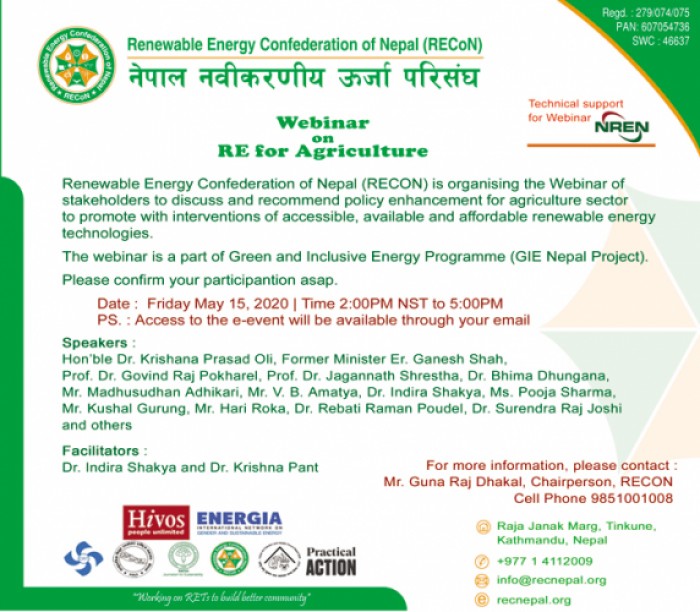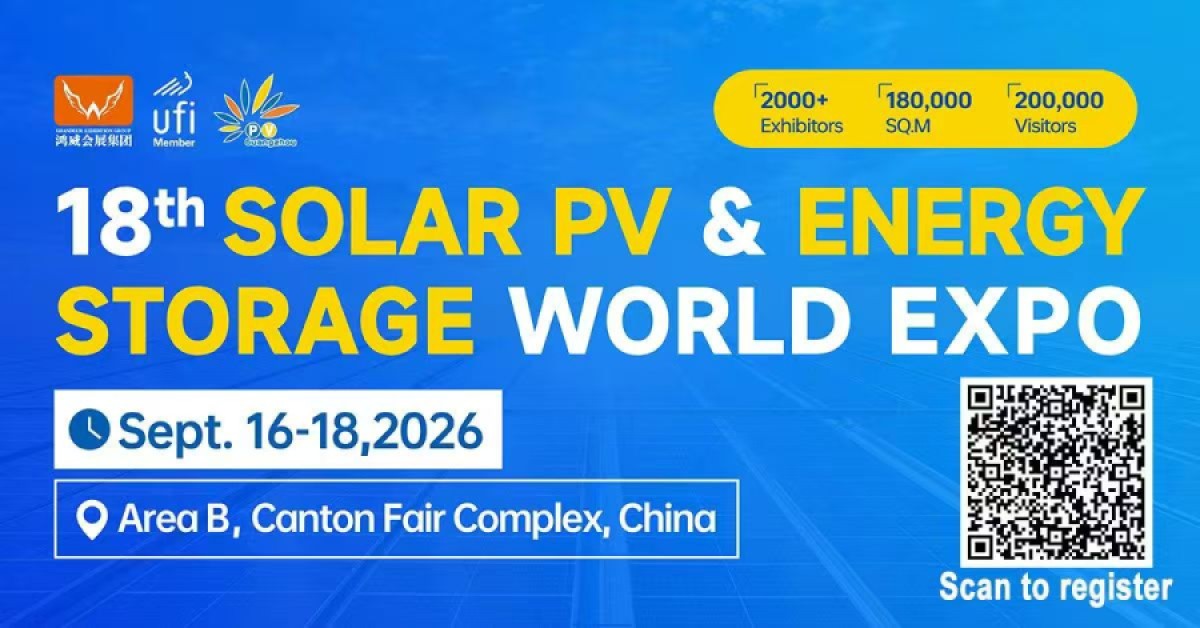
Renewable Energy Confederation of Nepal (RECON), for years, has been putting efforts on powering agriculture in Nepal with renewable energy technologies. So as discussions and interactions with politicians, planners, government agencies, non-government organizations, development partners, academia, entrepreneurs, professionals, practitioners and so on to share knowledge and experiences on RE for Agriculture. Such ideas generated have been lodged to concerned agencies for consideration in formulating policies. Many such ideas which open up benefits for farmers, entrepreneurs and consumers still wait to be taken into action.
The ongoing global pandemic of coronavirus made every aspect non-functioning so as economy took downward trend and a tremendously large number of working people turned jobless in the world. Consequently Nepal has been facing the pandemic troubles including economic slowdown which adds challenge of managing citizens returning home from abroad.
Agriculture in Nepal has been the occupation for 66 percent of population and it has been contributing around 30% of GDP. Even then this occupation could not make farmers self dependent and feel pride. The production for many is not sufficient for a year to feed. So as youths look job abroad at the cost of heavy labour and even life. So as, farming land turned uncultivated. As a result, Nepal is importing food materials expending a huge sum of money.
The Webinar organised by RECON on Friday May 15, 2020 discussed on development of agriculture utilising renewable energy technologies. Experts emphasised on accessing and availing bio-fertiliser produced from bio-gas plants, Solar PV Pumping for irrigation, Solar dryers, cooling systems at affordable manner. Experts elaborated that agriculture profession should be a dignified trade. Farmers therefore need to be ensured better payback. Improvised seeds, handy machines, subsidy, credit at low rate of interest, insurance, ensuring of good price of products, capacity building, community farming, cooperatives to involve could dignify the occupation, they emphasised. Likewise the experts pointed out that health, education, transportation and communication facilities are needed for farmers to stay in rural settings.
The webinar was participated in by Honourable Dr. Krishna Prasad Oli, Member of National Planning Commission. On the occasion, Former Minister Er. Ganesh Shah, Former Vice Chairman Prof. Dr. Govind Raj Pokharel, Academician Prof. Dr. Jagannath Shrestha, Executive Director of Alternative Energy Promotion Centre Mr. Madhusudhan Adhikari, Chief of Prime Minister Agriculture Mechanisation Programme Dr. Rewati Raman Poudel, RE expert Mr. Vishwa Bhushan Amatya, RE expert Mr. Babu Raja Shresha, Sr. Engineer at MoALD Ms. Sangita Shrestha, Executive Director of Centre for Rural technology Nepal Mr. Ganesh Ram Shrestha, Officiating President of FNCSI Mr. Umesh Prasad Singh, Mr. Suresh Man Shrestha, Gender and Energy Expert and Programme Manager of GIE Nepal Project Dr. Indira Shakya spoke on better use of renewable energy technologies for agriculture in the country to uplift the farmers living standard, minimise import of food materials by utilising uncultivated land, create employment opportunities in agriculture and also support industrial entrepreneurship.
Ms. Pooja Sharma and Mr. Min Bikram Malla from Practical Action Nepal, Dr. Surendra Joshi from ICIMOD, Mr. Kushal Gurung form Gandaki Urja Pvt. Ltd. and Mr. Prem Sagar Subedi form NREP through PPTs elaborated research, studies and experiences as the best practices on renewable energy technologies for agriculture and also to benefit women, underprivileged communities, disable and poor people, on the occasion.
The e-event on RE for Agriculture was participated in by 140 personalities representing relevant institutions and freelancers. RECON Chairperson Mr. Guna Raj Dhakal presided over the programme facilitated by Dr. Indira Shakya and Dr. Krishna Pant.
Renewable Energy for Agriculture or RE4Agriculture is a concept coined by Renewable Energy Confederation of Nepal (RECON) and relevant institutions. The government agencies, development partners, donors, academia, professionals are also paying attentions to agriculture occupation to make sustainable. Amalgamation of technical intervention and enhancement of traditional practices are considered to be instrumental in the changed global scenario.
RECON has been putting efforts on knowledge and experience sharing and views and opinion building of professionals and practitioners involved in renewable energy promotion activities in Nepal. They are particularly dedicated in energy access to the people living in remote areas of mountain and hill districts and other accessible locations as well. Learning lessons and gaining experience of last year event and before, an intensified effort on RE for Agriculture has been thought as an influencing activity. Time has come for the stakeholders of RE and agriculture work together to find the ways for more agriculture products to grow to check import of food grains, vegetable and fruits from other countries. The methodologies may be looked complex but they are the needs of the day. The government and other agencies are planning better agriculture methodologies with intervening modern technologies as well.
The Government of Nepal had formulated Mechanisation in Agriculture with a focused programme and also had formed a dedicated committee for promotion of bio-fertiliser are the opportunities for RETs to introduce as appropriate technologies while R&D on the same may be carried out for the better output in terms of enhanced inputs and in terms of optimisation of technologies, resources and finance. Likewise, capacity development in RE for Agriculture may be a 'bonus' for the country to reduce import of food items and engage more human capital in agriculture sector in an organised and managed manner.
The governments in all three levels in the federal governing system have realised to prioritise agriculture products to increase and improve living quality of the farmers. They pledge possible interventions including of providing facilities of RETs to this respect. The academia, exporters and entrepreneurs as stakeholders are also putting efforts of success of the national mission on agriculture.
The RECON organised interactions on RE for Agriculture were successful on the subject matters to bring in to discussions of stakeholders as a knowledge sharing exercise. The essences as the outcome of the event will be recorded, compiled and submitted to concerned agencies with view to well consider in formulating improved policies, plans and programmes.
Those were RECON efforts on knowledge and experience sharing and opinion building of professionals and practitioners involved in renewable energy promotion activities in Nepal. They are particularly dedicated in energy access to the people living in remote areas of mountain and hill districts and other accessible locations as well. Learning lessons and gaining experience of last year event and before, an intensified effort on RE for Agriculture has been thought as an influencing activity. Time has come for the stakeholders of RE and agriculture work together to find the ways for more agriculture products to grow to check import of food grains, vegetable and fruits from other countries. The methodologies may be looked complex but they are the needs of the day. The government and other agencies are planning better agriculture methodologies with intervening modern technologies as well.
RECON has been actively involved in the GIE Nepal Project as one of the consortium partners led by CRT/N. The confederation joined the consortium in 2017 with view to utilise the private sector strength to the GIE movement in Nepal and also to support private sector to contribute to the movement. The confederation which is the common forum of associations of private sector involved in supply and delivery of alternative energy systems and services, and NGOs involved in promotion of alternative energy in Nepal has been successful in achieving the goals of the programme. Support of the GIE Nepal Project, supports of experts, professionals and its own efforts had contributed significantly to the cause of renewable energy technologies to be available to the people living in remote and far from the locations where national electricity grid transmission is stretched. The voices and activities of RECON on policy to make more target group oriented have been taken as exemplary in some cases.
Title |
Attachment |
| Agriculture and RE in Agriculture VBA | Download |
| Biofertilizer from biogas | Download |
| Energizing_GIE PPT | Download |
| RE for Agriculture (ICIMOD) | Download |
| Powering Ag_NREP | Download |




